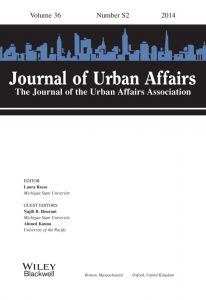George Ritzer Guest Post – Consuming America: What Have We Done to Ourselves?
By: George Ritzer
Distinguished University Professor, University of Maryland

(Note: The Following comments were prepared for a symposium sponsored by the Center on Religion and Culture, September 15, 2009.)
Let me begin by quarreling with the title of this discussion. I think it is certainly a good idea to focus on consumption because: (1) of its enormous importance in the developed world; (2) it is not going away even with the current recession; and (3) it reflects a willingness to move beyond our traditional, and now outdated, focus on production. However, a discussion of consumption in the U.S. cannot be divorced from issues relating to production, including the decline in the U.S. and the rise elsewhere in the world, especially Asia, in production. Further, we need to realize than an artificial distinction is being made between consumption and production. These two processes have always been combined in the process of prosumption and that phenomenon has increased greatly in recent years with the growth of systems (e.g., fast food restaurants, ATMs) that rely on putting consumers to work (producing) and, most importantly on the Internet, especially Web 2.0 sites (e.g. Facebook, Wikipedia, blogs) where the consumer is also the producer of the content on those sites (vs. Web 1.0 sites such as Yahoo where the content is created by the producer).
I would also quarrel with a focus on America in a global age in which nation-states, including the U.S., are of declining importance. This is true in the realm of consumption in the sense that what is consumed in the U.S. cannot be separated from what is produced elsewhere in the world (especially China), as well as what is not being consumed by many (“the bottom billion”) in many parts of the world. Hyperconsumption in the U.S. (and other countries such as Great Britain where the level of consumer debt is higher than in the U.S.) and its relationship to under-consumption in the less developed world is a global issue and needs to be discussed in that context.

Then there is the question: What have we done to ourselves? What do we mean by ourselves? It could be Americans in general, but that is too broad a category since most of the upper class has not hurt itself, or suffered very much (Bernie Madoff and many of his clients are exceptions) and many in the lower class cannot be seen as playing a large enough role in consumer society to be hurt by its decline (although they have been hurt, and hurt the most, by the larger economic decline). Thus, the implication of this is that the main focus in this should be on the consumption of the vast American middle class (itself far too broad a category). However, to focus on the middle class, to blame it for its current predicament (high levels of consumption, indebtedness, foreclosure, etc.) is in many ways to “blame the victims”. In saying this, I am not saying the middle class is innocent; that it didn’t play a significant role in creating its own economic problems (greed manifested in too much consumption and debt; naivete about the problems they were creating for themselves). However, we need to look to the larger global and national forces that contributed mightily to the problems of the middle class (and to those of the U.S. in general). Let me enumerate at least some of them:
1-Cheap products.
a-For decades the US market has been inundated with cheap products (e.g. shiny electronic gadgets from Asia) that are often far more expensive in their countries of origin. These have proven hard, even foolish, to resist. As many have demonstrated, most recently Ellen Shell (2009) in Cheap, there is a high cost to low price (an idea most often associated with Wal-Mart) and one of those costs is its role in spurring hyperconsumption.
b- Then there is the seemingly low priced (but nonetheless highly profitable) industrial food that increasingly dominates our supermarket shelves and lies at the heart of the success of fast food restaurants, as well as higher-end restaurant chains. Inexpensive industrial food also has the same high costs, as well as its devastating effect on the health of consumers (obesity, diabetes, especially in children).
2-Easy, even fraudulent, credit. Given the events leading up to the Great Recession, I needn’t belabor the excesses and abuses of the mortgage and credit (and debit) card companies which lured millions of American consumers into high levels of debt for which they should never have qualified and that they had no way of ever repaying.

3-The billions, probably trillions, of dollars all invested by all sorts of companies have to make products alluring, even impossible to resist. Marketing and advertising are the obvious villains (see the TV series, “Mad Men”) here, but then there are those who build our spectacular contemporary “cathedrals of consumption” (Las Vegas casino-hotels, Disney World, cruise ships [the new Royal Caribbean Oasis of the Seas which can accommodate 6,000 passengers], mega-malls [e.g. the problem-plagued Xanadu in the Meadowlands across the river from New York City]) in order to lure consumers to them and then structure them in such a way that consumers are led, usually unwittingly, in the direction of hyperconsumption.
4-We must not forget the role played by the US government (and others) in inducing Americans, especially those in the middle class, to consume.
a-Long-running tax breaks such as deductions for mortgage payments (interest, taxes) that help fuel home-building and -buying.
b-Post 9/11 pronouncements by New York Mayor Rudy Giuliani and President George Bush that we needed to get out and shop (and Robert Reich’s response asking when it had become our public duty to consume -of course, it had and that responsibility continues).
c-Pronouncements and policies after the onset of the Great Recession and to this day including:
-Stimulus packages, 2008 tax rebates, as well as fears about the latter that people would save the money and not spend it on consumption
-Worry over the continuing unwillingness to consume and the increase in the savings rate (after decades worrying about our minuscule savings rate)
-Cash for clunkers; $8,000 rebates for first time home buyers, etc.
d-Fundamental contradiction: the government abhors, critiques the causes of the Great Recession (at least publicly)- especially hyperconsumption, hyperdebt- but it cannot countenance a smaller economy, lower growth, lower tax revenues, etc. The government feels the need to stimulate the economy in general, and consumption in particular, leading to at least the eventual possibility of renewed hyperconsumption, hyperdebt.
a-Return to an agricultural age? Not likely for many reasons- not enough money, profit in it; not enough jobs in an era of industrial agriculture.
b-Return to an industrial age? Not likely since most of our once-successful “smokestack industries” are dead or dying; they are too expensive to rebuild; other parts of the world have huge leads in these industries, especially technologically; we would need to pay our “new” industrial workers wages that approach those in the less developed world; etc.
c-(Return to) the age of services? Services are still important, but declining in at least some areas in the US (e.g. call centers, radiology) as a result of outsourcing; also traceable to recent declines in consumption since many service jobs (“McJobs”) related to consumption.

d-Lack of alternatives above brings us back to consumption (70% of US economy; importance of Consumer Confidence Index [CCI] vs. Producer Price Index [CCI]; from GM to Wal-Mart, Nike) as route to economic success in the U.S. (other alternatives? alternative energy; Green products, processes):
1-Can we buy enough consumer-related services from one another to make for a prosperous economy?
2-Is our economy really helped by buying more cheap (sometimes dangerous, unhealthy) products from China, etc?
3-Can we, or any economy, consume ourselves to affluence? It now seems clear that pre-2007 many mainly consumed themselves into the illusion of affluence.
A Likely Future Scenario:
a- Our global economic position after WW II (advantages in production) and after 1970- or 1950s and the “Consumer Republic”(advantages in consumption; rise of consumer society) were both unsustainable
b-The US will need to adapt to a relatively smaller economy (lower wages; less hyper-, conspicuous-, consumption)
c-A global redistribution of wealth (OPEC, China, India, Brazil, etc.) is underway
d-Greater global economic equality is welcome (easy for me to say), although new inequalities are arising (e.g., oil-producing states)
Hope?
a-Creative Destruction- something new to arise on the base of the wreckage (empty auto factories, strip malls, big-box stores) of production and consumption in the U.S.
b-Comparative advantages in the US- creativity, ingenuity, innovative use of compressions of space and time, increases in speed,
Will We See a Change in Values (e.g. hyperconsumption, hyperdebt)?
There are positive movements in the direction of a change in values (voluntary simplicity, Slow Food), but I’m never optimistic about values changing on their own, especially in consumption which arguably became our “religion” (with its “cathedrals of consumption”). However, to the degree that they are forced to change, they are more likely to change as a result of larger structural changes. They will change as a result of the structural changes discussed here (e.g. global redistribution of wealth), but those with vested interests in hyper-consumption, -debt (the U.S. government, producers, consumers, banks) will oppose such changes (and who, what is strong enough to oppose successfully such a confluence of powerful actors?).
George Ritzer is Distinguished University Professor at the University of Maryland. He has chaired the American Sociological Association’s Section on Theoretical Sociology, as well as the Section on Organizations and Occupations, and is the first Chair of the section-in-formation on Global and Transnational Sociology. His books include The McDonaldization of Society (5th ed., 2008), Enchanting a Disenchanted World (2nd ed. 2005), and The Globalization of Nothing 2 (2nd ed., 2007). His most recent book is Globalization: A Basic Text (Blackwell, 2010). He is currently working on The Outsourcing of Everything (with Craig Lair, Oxford, forthcoming). He was founding editor of the Journal of Consumer Culture. His books have been translated into over twenty languages, with over a dozen translations of The McDonaldization of Society alone.
Add to: Facebook | Digg | Del.icio.us | Stumbleupon | Reddit | Blinklist | Twitter | Technorati | Yahoo Buzz | Newsvine








1099-0860/asset/NCB_logo.gif?v=1&s=40edfd0d901b2daf894ae7a3b2371eabd628edef)
Wonderful blog! Do you have any hints for aspiring writers? I’m planning to start my own site soon but I’m a little lost on everything. Would you advise starting with a free platform like WordPress or go for a paid option? There are so many choices out there that I’m completely overwhelmed .. Any recommendations? Cheers!
toms2015.org http://www.toms2015.org